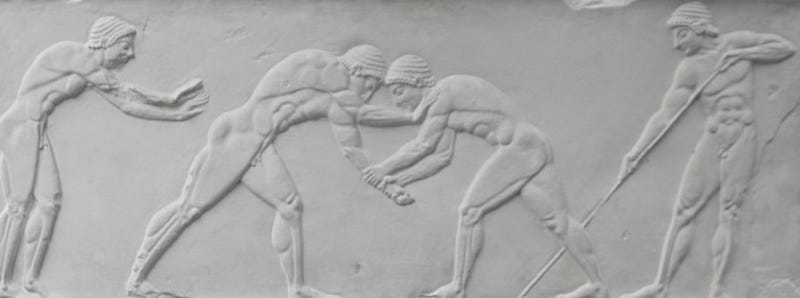Practice like a Stoic: 26, Turn difficulties into opportunities
Use life's challenges as your personal virtue gym
[This series of posts is based on A Handbook for New Stoics—How to Thrive in a World out of Your Control, co-authored by yours truly and Greg Lopez. It is a collection of 52 exercises, which we propose reader try out one per week during a whole year, to actually live like a Stoic. In Europe/UK the book is published by Rider under the title Live Like A Stoic. Below is this week’s prompt and a brief explanation of the pertinent philosophical background. Check the book for details on how to practice the exercise, download the exercise forms from The Experiment’s website, and comment below on how things are going. Greg and/or I will try our best to help out! This week’s exercise is found at pp. 159-161 of the paperback edition.]
“We see athletes, who study only their bodily strength, engage in contests with the strongest of men, and insist that those who train them for the arena should put out their whole strength when practicing with them. They endure blows and maltreatment, and if they cannot find any single person who is their match, they engage with several at once. Their strength and courage droop without an antagonist; they can only prove how great and how mighty [they are] by proving how much they can endure. You should know that good men ought to act in like manner, so as not to fear troubles and difficulties, nor to lament their hard fate, to take in good part whatever befalls them, and force it to become a blessing to them. It does not matter what you bear, but how you bear it.” (Seneca, On Providence, 2)
The Stoics often used analogies to illustrate their philosophical points, and one of their favorites was that of the gym. It is perhaps no coincidence that two of the most famous schools of philosophy in antiquity, Plato’s Academy and Aristotle’s Lyceum, were both housed in old gymnasia. Here Seneca exploits the metaphor elegantly, as usual, by reminding us that serious athletes—those who want to become better and more competitive—do not skirt challenges; they embrace them, seeking the strongest opponents for their training, and sometimes even more than one opponent at a time. Indeed, they are invigorated by the challenges they face.
So, too, for us in life. Every circumstance we experience is an opportunity to test and improve our virtue—from the minor inconveniences in life, which we can train ourselves to bear with no irritation, to significant obstacles such as divorce. The idea isn’t to go through life with a stiff upper lip, as the incorrect stereotype of Stoics goes. Rather, we learn from our experiences, recognizing the part we may have played in their occurrence, and steering ourselves to do better the next time around.
Stoics do not “lament their hard fate,” as Seneca puts it. After all, lamenting something we can no longer change, something that is firmly outside of our control, does us no good. Why add self-inflicted misery to whatever problem we are already facing or trying to recover from?
It’s also important to focus on attitude here. This lesson is about more than just learning from what happens to us and enduring what needs to be endured. By way of the gym analogy, Seneca is prompting us to look forward to the challenges of life. If tackled with the right mindset, our challenges make us into better people. As Seneca puts it on another occasion, every ship pilot is good when the waters are calm, but it is the storm that both tests and improves his skills. And what is the fun in always navigating flat waters?





This has definitely been an important point for me - looking at things I don’t want to do or experience as opportunities for character growth. If I can get through this and develop good mental habits in terms of how I respond to things, and if I can persist in this over time, I will naturally be better and happier!
This brings to mind my experience in the US Navy aboard ship. There were necessary hardships, being in the nature of shipboard life. I adapted to them. Where Stoicism would have helped me forty years ago was in what I felt was “unnecessary hardships”. This was my fault, resentment towards people who were rude in my opinion. Those who constantly complained about life aboard ship, people who were loud, etc. I’m an introvert who has always been introspective, so my inability to think deeply felt like a violation, and used to induce panic because I over identified myself with my thoughts.
My practicing Stoicism has been a blessing to me in my attitudes towards other people. I am grateful for the peace of mind I have found.